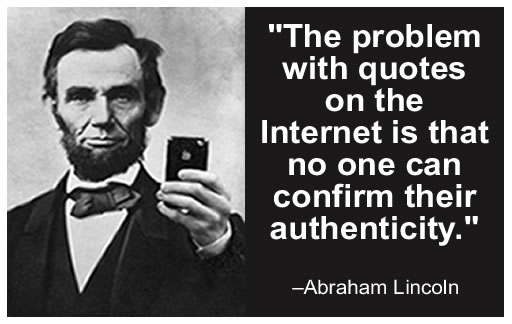Well, it's July 4th. Time for the dominionists and nationalists to start flooding Facebook with their versions of American history, which, of course, will include lots of memes with supposed quotes from Founding Fathers and such. And we know they are true quotes, because there's a picture of said Founding Father next to the quote, right?
Well, Abe that's not exactly true. Most people have, on their computers, access to something called "Google," which should enable them to look stuff up and find out the real story, even if thy have to wade through a lot of crap to do it. Quotes are one of the easiest things to fact check, because there are organizations out there that are devoted to the writings of individual historical figures, and they frequently provide information about fake quotes as well. Beyond that, we have wikiquotes, Brainyquote, and just plain old fact checking sites like Politifact and Factcheck.org. So if you're posting a fake quote, you really have no excuse.So, this popped up in my newsfeed today. I had checked the top and bottom quotes before, so I already knew the were "spurious," as they say. But I don't just call bullshit; I think it's important to source my info. So I went to Google and typed in "quote Patrick Henry founded religionists," and came up with several search results, and the very first one was Fake Quotations: Patrick Henry on “Religionists” « Fake History. The webpage not only gave the origins of the quote, it explained the linguistic problems as well. And, of course, you cant have a fake quote about religion without the obligatory reference to David Barton.
For the Jefferson quote, I googled "quote Thomas Jefferson God who gave us life." Among the results was this one from a website called "The Constitutional Principle," which explored more than one fake quote. What was interesting about this particular quote is that it was actually comprised of portions of three different real quotes. And again, at the bottom of the page, another reference to David Barton, this time with a link. (For those of you who aren't familiar with him, David Barton is a man who makes his living by peddling dominionist history and fake Founders' quotes.)
Before I could get to the third item, second on the meme list, my friend who posted the meme commented, "Just cause you find some clever website in the Internet does not make something true. I could find articles right now that say scientifically the that the sky truly is not blue. These quotes came from history books not the Internet."
There was no way to answer that without getting into some silly side argument, so I just encouraged him to do his own research. "Fact checking is not that hard," I said.
But, as it turned out, that wasn't necessarily true. There doesn't seem to be any actual information regarding James Madison's thoughts on Isaiah 33:22. There are lots of sites that state as a matter of fact that the verse was his inspiration for the three branches of Government, but they provide no references to his writings to verify it. Nor do the websites that document his writings even mention the concept. There are reasons to doubt: the fact that he was a STRONG proponent of the separation of church and state is heavily documented. But I didn't find anything pro or con on the subject I was researching. I don't want to get into a Russell's teapot argument, so if any of you readers out there can find proof one way or the other, I'm interested.
On a side note, I really didn't have to go to all the "clever websites" to find the info on the other two; as it turns out, I could have just gone to Snopes.
There is a principle of logic that says that you cannot prove logic with illogic. It is this principle that makes us understand that the question "can God create a rock so big he can't lift it?" is a stupid question. But I think there should be a similar adage governing the use of false information. In our court system, witnesses swear to tell the truth, because it is understood that the presentation of false testimony leads to injustice. So why is it okay to use demonstrably false information to support one's version of truth? If something is truly good or bad, desirable or undesirable, why is it necessary to make up stuff to prove it? If something is true, shouldn't the real data support it?
But if the lie supports our beliefs, do we even care?

No comments:
Post a Comment